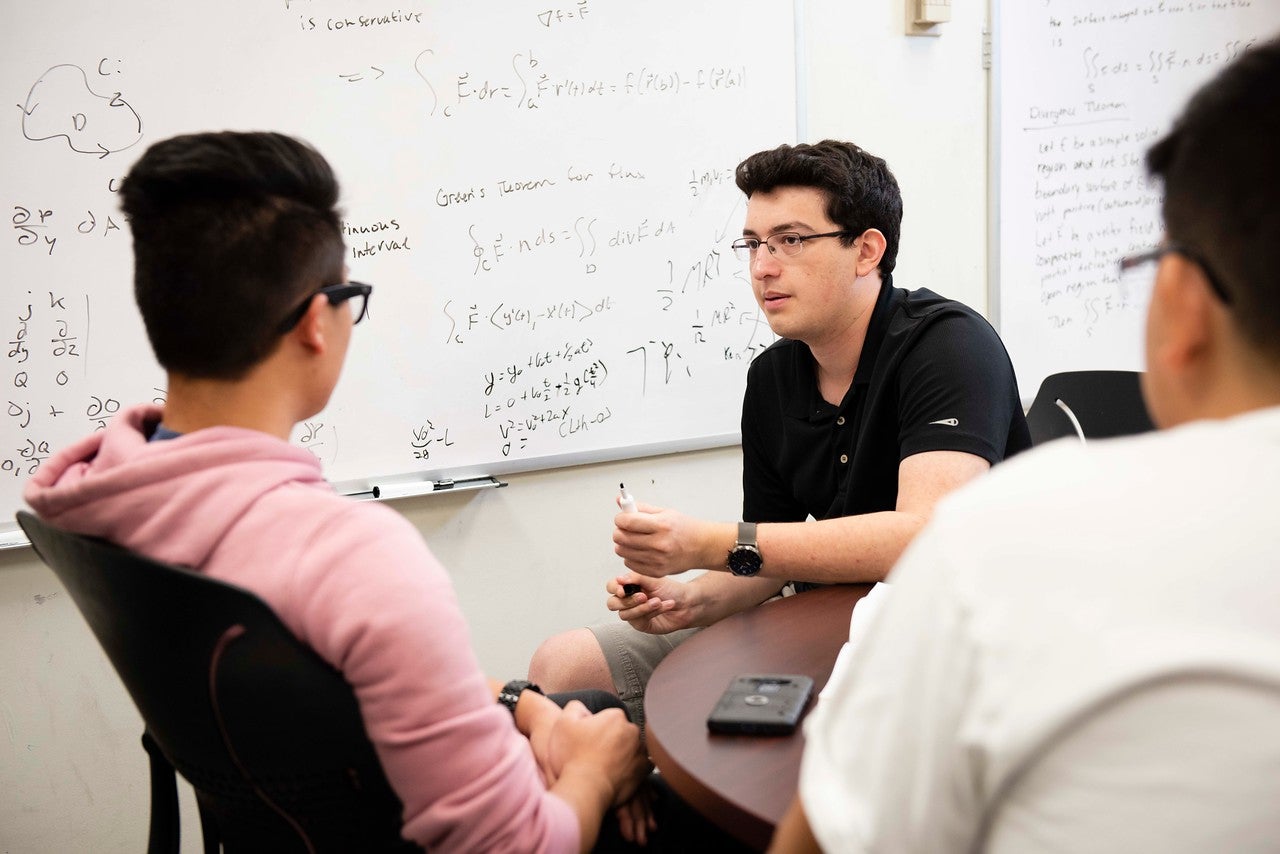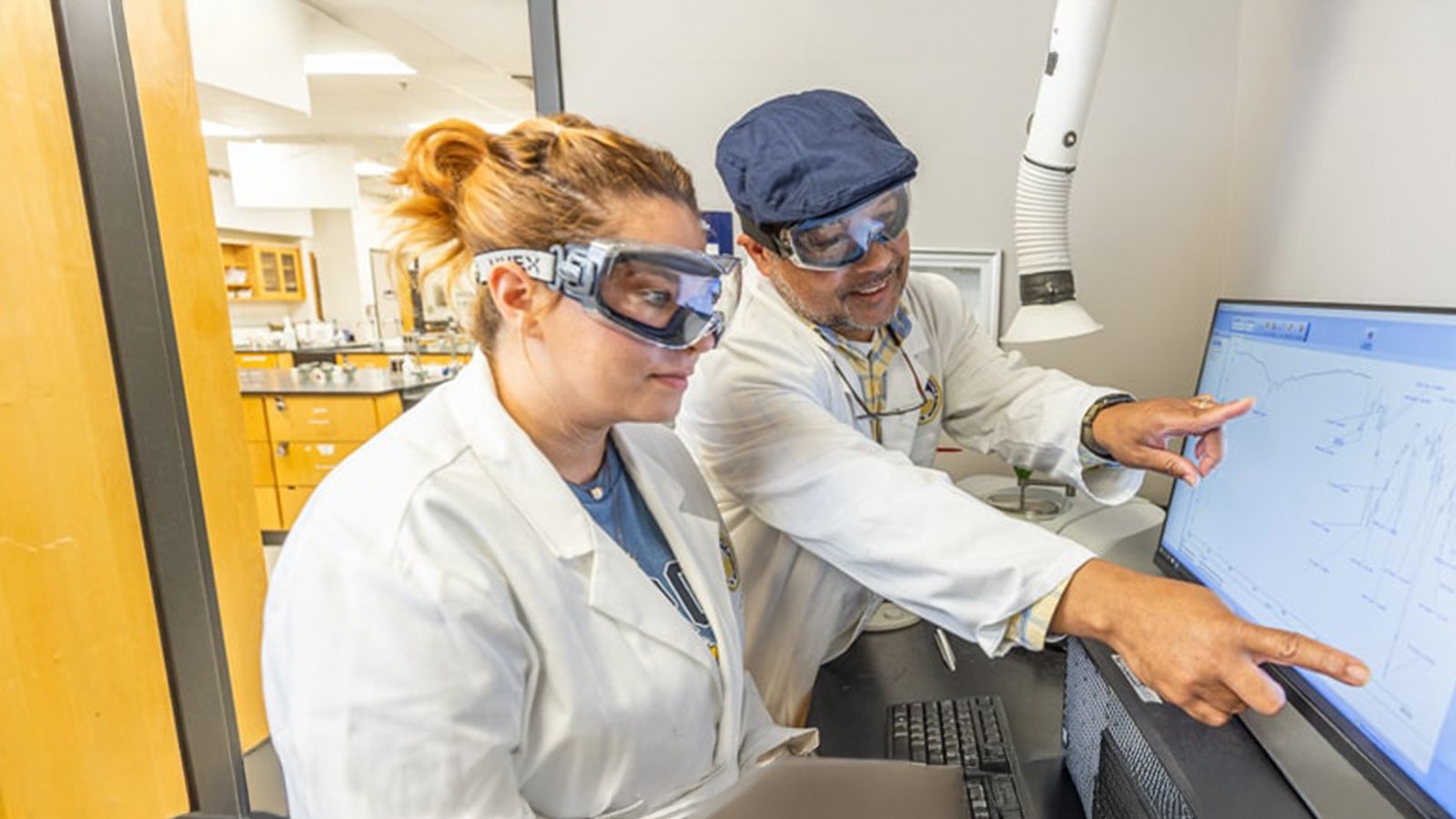Productive Research
The College of Science and Mathematics has a proud history of research productivity. Faculty within the College regularly lead the University in publications, and grant dollars. Faculty have published their findings in the highest quality journals including Science, Nature, and others. Faculty have also received grants from the National Science Foundation, National Institutes of Health, and National Oceanic and Atmospheric Association, to name just a few. The College has four research groups, yet also has a diverse array of researchers who study fundamental questions in a wide variety of fields. You can find more information on pages herein, on Departmental pages, as well as use the “Expertise Search” link to find researchers across the University.

Centers & Institutes
Office of Undergraduate Research
The College Office of Undergraduate Research (COUR) is active on both the Armstrong and the Statesboro Campuses. The mission of the office is to further the Undergraduate Research Experience in the College of Science and Mathematics at Georgia Southern University by supporting and enhancing existing faculty-undergraduate research, facilitating the creation and support of new faculty-undergraduate research initiatives, and showcasing faculty-undergraduate research. The office manages awards, grants, and undergraduate research symposia on each campus.
Planetarium
The Georgia Southern University Planetarium is an immersive astronomy laboratory in the Department of Physics within the College of Science and Mathematics. It is used to teach university courses and labs daily, as well as an independent study planetarium course for university students.
The Georgia Southern University Planetarium offers full-dome presentations for Georgia Southern University students, public/private/home school groups, grades Pre-K – 12, scout groups, and adults by reservation only on certain weekdays.
There are also monthly public events on exciting astronomy topics and full-dome presentations scheduled each year with telescopic observing outdoors, weather permitting.
The Georgia Southern Planetarium is housed within the Department of Physics.
Center for Advanced Materials Science | GS-CAMS
The Georgia Southern Center for Advanced Materials Science (GS-CAMS) is dedicated to enriching the educational journey for undergraduate and graduate students in the field of materials science. With a focus on pioneering research in both fundamental and applied materials, GS-CAMS strives for national acclaim. Moreover, the center is committed to fostering economic growth and development, not just in southeast Georgia, but extending its impact beyond the region. Explore how GS-CAMS is shaping the future of materials science and contributing to broader socio-economic advancements.
James H. Oliver, Jr., Institute for Coastal Plain Science
The Institute for Coastal Plain Science facilitates interdisciplinary research and education toward understanding the physical and biological resources occurring below the fall line and their sustainable use and management.
Campus partners on Skidaway Island, including Skidaway Institute of Oceanography, Grays Reef National Marine Sanctuary and the University of Georgia Marine Extension Service, provide opportunities for a variety of collaborative interactions.
The Institute for Coastal Plain Science is also home to the U.S. National Tick Collection. It is the largest tick collection in the world with more than a million specimens including representatives of most of the world’s ca. 850 species. The collection remains the property of the Smithsonian Institution but in 1990, the entire collection, its curator, assistant curator, and associated literature files, were moved to Georgia Southern on a long-term enhancement loan initially funded by the National Institute of Allergy and infectious Diseases. The collection is a national treasure that allows tick identifications and related research to be carried out on a worldwide basis. This vital function allows ticks that are medically important or that parasitize livestock or pets (including those that transmit pathogens such as the agents that cause Lyme disease or Rocky Mountain spotted fever) to be distinguished from species having less economic importance. Short tours of the collection can be arranged by appointment.
Sustainable Aquaponics Research Center (SARC)
The Sustainable Aquaponics Research Center (SARC) is a joint venture between Georgia Southern University and the FORAM Foundation. Our aquaponics system is located in an approximately 4100 square foot greenhouse that supports student and faculty research in areas of Biology, Chemistry, Economics and Engineering.
The SARC facility is a state of the art system designed to research the economic and biological sustainability of aquaponics systems. SARC has four independent recirculating systems, each containing 900 gallon tanks capable of holding over 100 mature tilapia (1-2 lbs/each) and 224 square foot runways for growing plants. This proprietary system was uniquely built to conduct controlled scientific research. This allows the center to develop targeted experiments with the goal of improving the economic viability of large-scale aquaponics as a means of sustainable food growth requiring less resources and space.
Mission: To conduct cutting edge research, and to develop technologies and best practices that improve the sustainability and profitability of soilless farming techniques.
Botanic Garden
The Garden features over 11 acres of gardens on the early twentieth century farmstead of Dan and Catharine Bland. Wander the trails, paths and courtyards and explore the intriguing natural and cultural wonders of the southeastern coastal plain, where persistence, ingenuity, and a deep respect have bound people to the land. Discover a significant and growing collection of native and heritage plants, including over 20 of the state’s protected species. Peer down a pitcher plant, gaze upward at the gnarled branches of a magnificent longleaf pine, and inhale the heavy scent of confederate jasmine. Wrap your hands around the handles of a plow or admire the 1929 cover of Georgia Magazine, which features Mr. Dan and Ms. Catharine’s farm as an inspiration for all of Georgia. Enjoy the past, wonder at the present and learn for the future at the Botanic Garden.
The Garden offers woodland trails, a landscape garden of coastal plain natives, a native azalea collection, an arboretum, a children’s garden, a complex of early 20th century farm buildings, the Rural Life Museum, the Whelchel Camellia Garden, heritage gardens, a bog and sandhill, and the Kennedy Outdoor Classroom. The Garden is a research and educational resource for faculty and students and provides undergraduate and graduate programs, projects, and internships as well as continuing education programs of interest to the community.
Partnerships
Environmental Protection Agency (EPA)
The partnership with the Environmental Protection Agency that was formulized in 2012 is focused on supporting the University’s efforts to become the flagship model of an academic institution that is environmentally sustainable in its campus infrastructure, its environmental policy, its engineering, science and public health curriculum and its community outreach. For more information please contact Dr. Lance McBrayer, lancemcbrayer@GeorgiaSouthern.edu.
Other Partnerships
Our faculty have numerous other research collaborations with universities and research institutions, such as the University of Manitoba and the Technical University Freiburg, Germany. We maintain active partnerships with the regional public school systems via diverse sets of programs.
Hollings Marine Laboratory
The partnership with the Hollings Marine Laboratory has been established to enhance research, teaching, outreach, career development, and stewardship, and leverage resources in environmental sciences and public health. Of specific interest to this partnership is:
- The improvement of the environment and resources in the Coastal Plains of South Carolina and Georgia, supporting and collaborating with the newly created Georgia Southern University Institute of Coastal Plain Sciences.
- An understanding of local environmental pollution causes and effects.
- Research causes for water contamination, its impact on public health and potential solutions
- Research for discovery and innovations relevant to understanding and mitigating environmental health issues for improvement of communities.
- Opportunities for research experiences for both undergraduate and graduate students in the area of environmental research.

